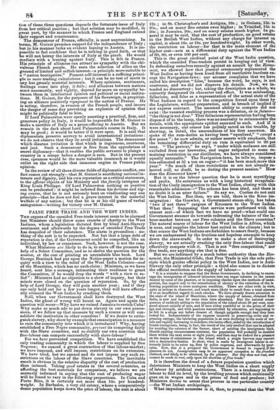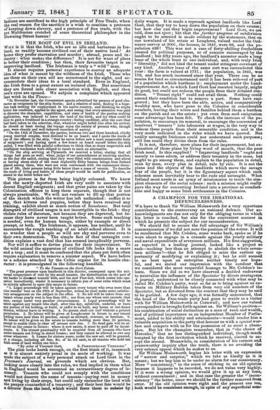FALSE FREE TRADE AND THE WEST INDIES. "THE organs of
the onesided Free-trade interest seem to be alarmed lest Ministers should throw some crumbs of charity to the West Indians, whom a legislation dictated first by blind Anti-Slavery sentiment and afterwards by the dogma of onesided Free Trade has despoiled of their substance. The alarm is groundless : no- thing of the sort is to be expected. Not but that a large debt of reparation is due, if the Government could be compelled, like an individual, by law or conscience. Such, however, is not the case. What Ministers are likely to do is, to stave off the pressure by help of a Select Committee, and so to shelve the question for the session, at the cost of printing an unreadable blue book. Lord George Bentinck had put upon the Notice-paper a motion for in- quiry with a view to the relief of the West India Colonies—and of the Mauritius, which has no such claim : Ministers, as we have heard, sent him a message, intimating their readiness to grant the Committee, if he would drop the words " with a view to re- lief": Ministers had no objection to a show of inquiry, but their minds were closed on the question of reparation. So, by the help of Lord George, they will gain another year ; and if they can only hold out for a few years longer, they will have effectu- ally silenced the West Indies by crushing them. Still, when our Government shall have destroyed the West Indies, the ghost of wrong will haunt us. Again and again the question will recur—Why have we ruined Jamaica to enrich Cuba? Why make so much ado to put down slavery in our own posses- sions, if we follow up that measure by such a course as will con- solidate the institution in other countries ? If we desire to extin- guish slavery, why show by example that emancipation is a measure to ruin the community into which it is introduced? Why, having established a Free Negro community, prevent its competing fairly with the Slave countries, and so stultify our own assertion that free-labour can compete successfully with slave-labour ? For we have prevented competition. We have established the only trading community in which the labour is supplied by free Negroes ; we caused a great contraction of that labour-market; we have imposed, and still impose, restrictions on its extension. We have tried, but we cannot and do not impose any such re- strictions on the labour of the Slave countries. The inevitable result is obvious in the relative disparity of the cost of production thus induced. Taking good estates in the several countries, as afferding the best materials for comparison, we believe we are correctly informed in saying that the cost of producing sugar will be found is certainly in the following proportions. In Cuba and i Porto Rico, t s certainly not more than 10s. per hundred- weight. In Barbados, a very old colony, where a comparatively dense population keeps down the price of labour, the cost is about 12s. ; in St. Christopher's and Antigua, 16s.; in Guiana, Ms. to 20s., and on many fine estates even higher ; in Trinidad, 153. to 20s.; in Jamaica, 20s., and on many estates much higher. In ge- neral it may be said, that the cost of production, on good estates in the British West Indies, without any charge for interest on capital, is about 16s. or 18s. per hundredweight. In other words, the restriction on labour—for that is the main element of the higher cost—acts as a differential duty against the West Indies of 60, 80, or even 100 per cent.
This is the great cardinal point of the West India question,
which the onesided Free-traders persist in keeping out of view. In defending ourselves recently against an assault by the Econo- mist, we showed how that journal erroneously represented the West Indies as having been treed from all restrictive burdens ex- cept the Navigation-laws : our accuser complains that we have called his description "false," because the word, he says, is not courteous, and we did not disprove his details. Now, we in- tended no discourtesy ; but, taking the description as a whole, we correctly designated its character and effect. It was misleading-, fallacious and false as a representation of the actual state of the West Indians in regard to the competition forced upon them by the Legislature, without preparation, and in breach of implied if not express contract. The assumed ability to compete did not exist : the vaunted enabling process was a delusion, or in futuro- "the thing is not done." That fallacious representation having been disposed of in the lump, there was no necessity to reenumerate the • details, with the appropriate epithet annexed to each. And if it were necessary, our censor has politely saved us the trouble, by showing, in detail, the unsoundness of his first assertion. Be spoke of the rum-duties as having been "equalized," "except a few pence ": he now admits, or rather asserts with emphasis, that the remaining differential duty on rum is equivalent to 20 per cent. " The pretext," he says, "under which molasses are still excluded from our breweries, and sugar subjected to some re- maining restriction in our distilleries, we have always considered equally untenable." The Navigation-laws, be tells us, impose a loss estimated at 3/. a ton on sugar—" it has been much more this year." "So much of these restrictions as are not already re- moved mill, no doubt, be so during the present session." How does the Economist know ?
But it is on the labour question that he is most mystifying
and prolix. He entertains us with a long historical recapitula- tion of the Cooly immigration to the West Indies, closing with this remarkable admission—" The scheme has been tried, and there is no doubt it is an utter failure." So say we. Coolies do not suit the West Indies. But then, we are told, there is the Kroo im-
migration: the Growler, a Government steam-ship, has taken two if not three" cargoes of Kroomen to the West Indies. What then ? Supposing that service were performed with the
utmost zeal—of which fact we have no proof—what could one Government steamer do towards redressing the balance of the la- bour-market between our Free colonies and the Slave countries? The natural source of labour for the West Indies is Africa, which is near, and supplies the labour best suited to the climate ; but to that source the West Indians are forbidden to resort freely, because we are embarrassed by the fruitless and hopeless attempts to keep down the slave-trade. In order to make a show of destroying slavery, we are actually crushing the only free-labour that could effectively compete with it. That is not free competition," nor free trade, nor anything else that is free. But we are informed by a much better authority than the Eco- nomist, the Ministerial Globe, that Free Trade is not the sole prin- ciple which guides official policy in the West Indies, nor is Anti- Slavery the only other principle : a third also comes in to dictate the official restriction on the supply of labour— "it is a mistake to suppose that the Home Government, in declining to encou- rage the immigration of coloured labourers into our sugar colonies to the extent desired by some of the planters, or in imposing checks upon the methods of immi- gration, has regard only to the reinstitution of slavery or the reduction of the Is bouring population to some analogous condition. There are other evils in view, quite as serious in character, and much more likely to result from a total absence of or an insufficient regard to such checks. We have already drawn attention to the state of the island of Mauritius, where the supply of labour, obtained from India, is now and has for some time been abundant. But the natural conse- quences of suddenly adding to the population of the island about 30 per cent, com- posed almost entirely of men, and of men either youthful or in the prime of their age and strength, and with passions uncontrolled by education, are beginning to be felt in a shape not before dreamt of, though palpable enough had they been looked for. Independently of the expense incurred in preserving order and re- pressing outrage, the labouring population is at once declining in the scale of mo- rals and rapidly increasing in numbers; the latter effect, aided by the introduction of female immigrants, being, in fact, the result of the only method that can be adopted for avoiding the extreme of the former, short of sending the immigrants back. Should existing circumstances continue, the population will probably be doubled there within the next seven or eight years; and then may be looked for a pressure on the means of subsistence in the island which a single harvest may convert into a destructive famine. In short, what is made by immigrant labour is ex- tremely liable to be eaten up, first by police expenses, and afterwards by poor- rates. Now, this is a prospect the Government is bound to regard, if the planters do not. Immigration may be an apparent exception to the freedom claimed, and likely to be obtained, by the planter. But this does not rest, and cannot be made to rest, only upon the doctrine offree trade."
It is therefore the dread of a future population question which determines Ministers to keep the West Indies on a short supply of labour by artificial restrictions. There is a tendency in -free labour to find its level, by the levelling process which continually goes on in wages and in the prices of food and produce; but Ministers decree to arrest that process in one particular country —the West Indian archipelago.
What impudent nonsense is it, then, to pretend that the West Indians are sacrificed to the high principle of Free Trade, when the real reason for the sacrifice is a wish to combine a pretence of keeping down slavery, and a pretence of free trade, with the pet Malthusian crotchet of some theoretical philosopher in the Downing Street bureau!



























 Previous page
Previous page